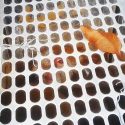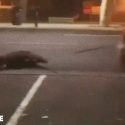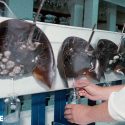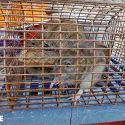Injections, inoculations, and intoxication: Mauritian macaques in French laboratories
Injections, inoculations, and intoxication: Mauritian macaques in French laboratories
27.11.2023
Île Maurice
Injections, inoculations, and intoxication: Mauritian macaques in French laboratories
Animal testing
Faced with the damning footage produced by our investigation within the Mauritian Noveprim company, we wanted to know what happens to the primates sold throughout the world by this business. The origin of macaques is sometimes indicated in scientific journals, which allows us to find out the tragic fate of many of those imported into France. We are asking for an end to capturing, breeding, and testing on primates
In a global database of publications that are freely accessible, other than a few results in North America or among our European neighbours, the name of the Noveprim breeding farm especially highlights research carried out in France.
While the industry generally grants the monkeys that it exploits with a name as well as their tattoo, this vague notion of identity disappears when the results obtained are published. Animals are therefore numbers, simple tools, sometimes listed in the same tables as viruses, antibodies, or even the software used.
A life of suffering
Numerous individuals instrumentalised in this way have had to endure varied ‘procedures’. This may be, at Sanofi(1), simple’ repeated blood tests, while other animals are subjected to ocular injections and are killed by GenSight and the Institut de la Vision to take their eyes(2). The French Alternative Energies and Atomic Energy Commission (CEA: Commissariat à l’énergie atomique et aux énergies alternatives) made it even worse by inflicting brain injuries at its MIRCen unit(3) and inoculating with serious diseases in its Biosafety level 3 (P3) laboratory(4).
Still at the CEA, NeuroSpin (which we know well for its repeated infractions of the regulations) immobilised three Mauritian monkeys under anaesthetic up to fifteen times each. After having injected microbubbles into their blood, the staff did an ultrasound of their head to try to facilitate the penetration of products into the brain(5).
The Ministry of Armed Forces recently confirmed that no experiment carried out on primates was led by their services since 2013; an article published in 2018(6) probably relates to one of its last uses of these animals. The armed forces here intoxicated eighteen macaques from Mauritius with a chemical weapon, the Russian VR nerve agent. Among them, four were dead in less than an hour, while the other, under treatment, endured hypersalivation, exhaustion, respiratory difficulties and convulsions for several hours before being put back… and being killed to analyse their tissue.
Let’s end with their exploitation
As shown by our investigation, animals are already suffering from captivity and brutal handling by employees of the Noveprim breeding farm. But for them, it is only the start of a life spent enduring stress and pain for the supposed benefit of another species that has decided that they are dominant.
To put an end to these practices, you can sign our petition asking for the closure of macaque breeding farms and an end to testing on primates.
Going further, you can consult our report on primates and animal testing and consult the data given year after year and species by species on our dedicated website.
- Sanofi 2020a, 2020b.
- GenSight 2021, Institut de la Vision 2023.
- CEA (MIRCen) 2019.
- CEA (IDMIT) 2021a, 2021b, 2022a, 2022b.
- CEA (NeuroSpin) ) 2020.
- Institut de Recherche Biomédicale des Armées (IRBA) 2018.
Translated from the French by Joely Justice









